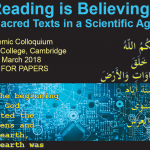It has been a long while since I radically revised my one-semester course on the Bible to focus on information literacy. The has, however, almost entirely focused on the wise use of sources about the Bible, and not what we can learn about bias and trustworthiness from within the Bible itself. But the Bible includes religious and political propaganda, and claims that are most likely historically counterfactual. As one commenter put it when responding to a post about Jesus’ birthplace being Nazareth rather than Bethlehem, the claim that he was born in Bethlehem is “fake news.”
We can see this in the way each of the two Gospels in the New Testament that tries to have Jesus of Nazareth be born in Bethlehem accomplishes it in very different ways. Here is what I wrote about that subject on Facebook yesterday (in a discussion of a blog post of mine from a previous year about “Contradictory Christmases”):
In Matthew’s Gospel, Jesus is simply to be found in a home in Bethlehem, where his family lives, with no indication whatsoever that they are from somewhere else. He is usually thought to be about 2 years old, since based on information about the star that heralded his birth, Herod kills all male children in Bethlehem who are 2 years old or younger. They flee to Egypt, and after Herod dies they want to return to their home in Judaea. But because Archelaus, Herod’s son, is on the throne, they fear to return and make their home in Galilee. The impression given is that this is how they end up in Galilee.
In Luke, the family is from Nazareth. The census under Quirinius, which takes place after Archelaus is deposed by the Romans, is cited as the reason they go to Bethlehem. Once Jesus is born, they go up to Jerusalem to fulfill what Leviticus 12 requires, which is that a woman undergo a purification rite after childbirth a little over a month after the birth. Luke tells us that once they did everything that the law requires there, they returned to their hometown of Nazareth.
Even apart from the discrepancy in dating (a couple of years before Herod the Great dies, vs. after Herod the Great’s son is deposed), the geographical movements simply do not fit together in any straightforward way.
And so I was very struck when the ASOR blog shared an article by Brendon Benz called ‘The Bible as Tool for Learning to Evaluate Competing Voices in an Age of “Fake News”.’ Here is the conclusion:
Again, the leading themes in the Bible and its interpretation are important on literary, historical, and theological levels. However, if they are received without challenge – if they are accepted absent a hermeneutic of suspicion – the reader will fail to hear the opposing voices that are embedded in the text. By contrast, if one approaches the text critically, it can serve as an important tool for helping ourselves and our students develop skills for disentangling the web of information with which we are confronted, of recognizing the potentially negative impact of prevailing storylines, and of hearing alternative points of view – even if we do not agree with them.
David Brin asked whether fact checking is really possible. The Wall Street Journal observed that librarians are busier than ever, an encouraging sign that people are not all just relying on their own abilities plus Google.
There has also been a call for skeptics to take the “pro-truth pledge” and take a stand against fake news. Unfortunately, calling oneself a skeptic, or even trying to be one, does not safeguard against fallibility or deception. The main reason for that is that our own thought processes, our process of reasoning and drawing conclusions, takes place in our minds in a manner that is at best partly accessible to us.
Returning to fake news and the Bible, Hemant Mehta noted the church billboard asking people to skip church since “it’s all fake news.” Ironically, Mehta then went on to give a guest blogger a platform for fake news, someone who does not accept the evidence for there having been a historical Jesus.
See also Mehta’s post about studying journalism at Liberty University, in which he writes, “Questioning dogma is what good journalists do, but Liberty is not a place where students are allowed to do that when it comes to certain issues.” Also relevant is the article in New Scientist emphasizing the need for critical thinking rather than mere gut feelings.
What do you think? Can the contents of the Bible be useful in teaching information literacy skills?
http://asorblog.org/2017/11/13/bible-tool-learning-evaluate-competing-voices-age-fake-news/













